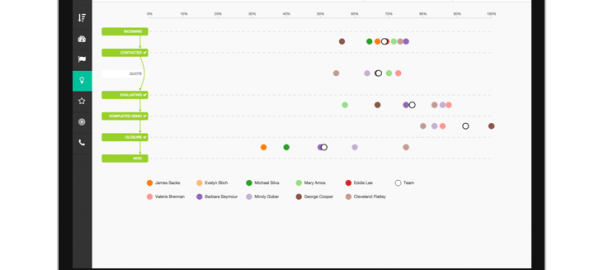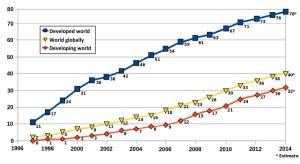As part of an industry built on a foundation of effective communication and influential relationships, salespeople sometimes think of data science as their worst enemy. Data science is often seen as an evil overlord, lurking over reps’ shoulders and reporting back on their every move to their supervisors. And then, of course, there’s the concern that eventually data science and machines will become so advanced that they will replace sales teams in their entirety.
Well, fear not. The truth is that there is no substitute for the human element in sales, and that data science can actually improve reps’ performance, make them more productive and help them develop better relationships with their prospects. As we’ll see, when used correctly, data science can strike an effective balance between helping reps personalize, standardize and automize key actions and activities.
Personalize
It’s no surprise that people respond better to content and communications when they’re tailored to their personal needs and interests. In fact, a recent study shows that personalized emails deliver 6X higher transaction rates than generic messages; however, the same study also shows that only 30% of companies actually personalize their emails. Hey, nobody said personalization was easy! Companies like PersistIQ are leading the way as they’re encouraging reps to pump the brakes with automation and bring the human element back to sales.
One of the biggest roadblocks when it comes to personalization in sales is the time it takes reps to research a prospect and tailor each piece of individual communication. What’s more, data by nature is messy and more often than not is spread across various disparate systems within a single organization, making it difficult to get a complete, consolidated view. Enter data science.
New technologies and tools are emerging every day that make it easy for reps to learn about their prospects and reach out with personalized messages. Take MadKudu, for example, a company that monitors prospects’ in-app behavior and gives reps a detailed breakdown of their free trial usage. Having this kind of information makes all the difference between sending an email like this:

Or like this:

Data science also helps to give reps a full picture of prospect and customer activities and interactions by merging information from across company platforms. This single view can highlight otherwise unseen opportunities for customized outbound sales and better-informed communications. For instance, with the new Base and Zendesk integration, sales reps can view customers’ open and past Zendesk tickets directly within Base’s contact and deal cards. This single view ensures that reps are not reaching out to customers for upsells in the middle of a support issue.
Standardize
While it’s important to personalize interactions with prospects and customers, the ability to standardize certain protocols and processes is invaluable to business success. One of the most important procedures for any company to standardize is its sales process, which outlines the exact steps reps must take to move a deal from one stage of the sales pipeline to the next.
Having a formalized sales process in place is proven to lead to a 65% increase in reps hitting their individual targets and an 88% increase in companies hitting their overall goals. But how does a team know if its sales process is right for the business, and how can it tell when and what changes should be made?
Using data and sales science, the effectiveness of a sales process can be accurately measured by mapping each step to the Sales Formula. The Sales Formula provides a consistent and reliable way to evaluate sales strategy over time across the key conversion points needed to turn a lead into a closed deal. While a business may adapt the formula to suit its own unique pipeline and process, the baseline formula and definitions for its variables is as follows:

Mapping a sales process to this formula may look something like this:

By dynamically analyzing hundreds of deals and processes using this same formula, data science will uncover variabilities in sales performance that lead to actionable insights. For example, you may discover that reps who have an onsite meeting sooner in the sales process are 2X as likely to close as those who have these meetings later. Or, perhaps deals where Demo 2 was shown instead of Demo 1 made it through the pipeline in half the time. Both of these discoveries provide the opportunity to standardize these proven practices within the sales process, ultimately saving reps time and setting them up for success.
Science can and should be applied to the sales process. We can go on and on about this. Also note that other dimensions (lead source, industry, contact title, etc.) of sales performance can be measured using this same formula to understand, optimize and standardize other key initiatives like lead scoring.
For reps to consistently execute against their sales process, and for managers to test and continuously refine their strategy, they must be using the latest sales technology that gives full visibility into the daily operations of the sales team.
Automize
While technology will never be able to replace the human element of sales, there are definitely some tasks that data science can automate to make sales teams more effective and efficient. One of these is sales reporting and intelligence.
Traditionally, sales reporting has been a meticulous, time-consuming exercise requiring sales leaders to spend days crunching numbers and rolling up reports in Excel. Sure, these reports might find their way to the frontlines of the business, but once they do, who’s to say they’re the most recent or most accurate versions?
Consider the following statistics:
- 60% of sales leaders have to wait for someone to give them access to their data
- 38% have to use 4+ systems to keep track of their goals and priorities
- Just 31% can view their data in a single dashboard
This poses a huge problem in today’s fast-paced, data-driven market where reps need to have real-time information to independently track progress and make more strategic decisions. Fortunately, data science has the power to seamlessly capture and process big data from across multiple sources in real time. This leads to visual dashboards and out-of-the-box reports that can be made available to each and every person on the sales team.
Jump into your outbound sales platform and see how your efforts are doing at the top of your funnel. Is Email Template A outperforming Email Template B? Does starting out with a call touch work better than a cold email? There are many critical factors for outbound sales success.

Diving into your CRM, at a higher level, you can look at your opportunities and stage conversion by owner. This provides much insight into pipeline health and sales team performance.

Now reps are able to get their hands on the reports they need when they need them, like sales goals, forecasts, call outcomes and more. Rather than entering 1:1s and being told they didn’t send enough emails, are performing at the bottom of the pack or are missing out on deals with the best lead source, reps can monitor data and manage performance on their own.
Striking a Balance
As a rep, seeing how data science can benefit you personally and help solve your day-to-day challenges may seem like a stretch. But the reality is that data science really can help you personalize, standardize and automize the key processes and procedures impacting your sales performance. If you’d like to learn more, check out this free eBook, From Art to Science: 5 Steps to Predictable Sales Growth.
Business & Finance Articles on Business 2 Community(78)





